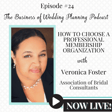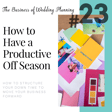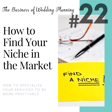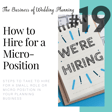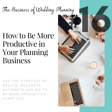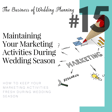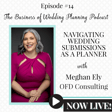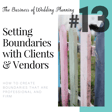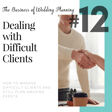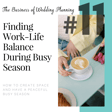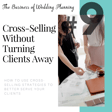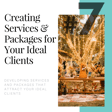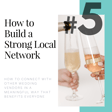Become a Creator today!Start creating today - Share your story with the world!
Start for free
00:00:00
00:00:01

Pricing Strategies for Wedding Planners
- Amber introduces the episode's focus on different pricing strategies and common pricing pitfalls for wedding planners.
- Emphasizes the importance of appropriate pricing for the sustainability of the business and to ensure profitability.
Episode Overview:
- Discussion on the necessity of making a profit to prevent burnout and sustain the business.
- Amber shares her personal struggles with underpricing in the early stages of her career, highlighting the challenges of not understanding the full costs of delivering services.
Segment 1: Common Pricing Pitfalls
- Underpricing to Compete: Amber discusses how entering the market with low prices can create unsustainable business practices.
- Overlooking Hidden Costs: Importance of accounting for all expenses to ensure pricing covers all costs.
- Inflexible Pricing Models: The drawbacks of a one-size-fits-all approach and its impact on client acquisition.
- Failure to Adjust Prices: Discusses the need for periodic price adjustments to reflect increased experience and changes in market conditions.
Segment 2: Pricing Models for Wedding Planners
- Flat Fee/Package Pricing: Benefits and challenges of using a flat fee model, including how to determine the fee based on scope assessment, cost analysis, and market research.
- Percentage of the Wedding Budget: Explains this model's alignment with the scale of the wedding, including average percentages and considerations for high-budget events.
- Hourly Pricing: Covers the straightforward nature of this model, its suitability for smaller tasks, and tips for determining competitive hourly rates.
Segment 3: Determining Your Rates
- Outlines methods to calculate appropriate rates, considering costs, market research, the target market's spending capacity, and the planner's level of experience.
Segment 4: Overcoming the Fear of Charging What You're Worth
- Strategies to recognize and communicate the value of one's services, using testimonials and case studies to justify rates.
Segment 5: Communicating the Value of Your Services
- Tips on highlighting unique service features, using visuals and stories in marketing, and educating clients about the wedding industry to enhance their appreciation of the planner's services.
Conclusion:
- Recap of the episode's key points on pricing pitfalls, value communication, and strategic pricing models.
- Announcement of the next episode's topic on upselling and handling out-of-scope requests.
- Amber thanks the listeners for tuning in and teases the next week's topic, encouraging them to tune in for more insightful discussions on running a successful wedding planning business.
Transcript
Introduction to the Podcast
00:00:02
Speaker
Are you a wedding planner just starting your business or have you been in the industry for just a few years? Do you want to build a profitable and enjoyable planning business that you're excited about every day? If the answer is yes, then you're in the right place.
Amber's Background
00:00:17
Speaker
Welcome to the business of wedding planning podcast.
00:00:21
Speaker
I'm your host, Amber Peterson. I was a wedding planner for 10 years, a marketing strategist for service-based businesses, and now the owner of Planner's Lounge.
Supporting Wedding Planners
00:00:31
Speaker
I know what it's like to work so hard as a planner but not see the growth and profit you dream of. I also know that while you can be the most talented planner in your market, if you don't have the business foundation, it will be hard to continue growing.
00:00:45
Speaker
I have seen so many talented planners burn out because they become frustrated with things unrelated to wedding planning, like finances, marketing, team growth, and operations. This is where the Business of Wedding Planning podcast and Planners Lounge come in. Our mission is to help you learn what it takes to build the business of your dreams with simple digital product solutions, educational content, and the support of our free community, the Very Important Planners Lounge, or VIP Lounge for short.
00:01:15
Speaker
I understand what it's like to work in this unique industry while having a lot on your plate. During my time as a planner, I had three daughters, bought and moved to two new homes, and launched two other businesses. I am excited to combine my education, industry experience, and passion to help you reach your business goals.
Pricing Strategies Overview
00:01:38
Speaker
Welcome back to the Business of Wedding Planning podcast, friends. I am so excited about our topic today. We are going to discuss different pricing strategies and the common pricing pitfalls that wedding planners can fall into. This is such an important topic and one that can be revisited throughout your career because you should be
00:02:00
Speaker
raising your prices at least annually and really evaluating if you're charging what you need to make a profit and actually bring some money home. I know when I was a planner, when I started out, I had so many thoughts and
00:02:17
Speaker
likely mindset issues around being new and I should just charge very, very little to make sure that people understood that I was new in the market and I just didn't feel like I could charge a fair market value. I felt like I had to work up to that.
00:02:37
Speaker
I can tell you that the burnout comes so much quicker when you realize you are working for pennies on the... pennies to an hour, even.
00:02:49
Speaker
After a couple of years in business, I sat down and really spent time tracking the hours I was spending with my clients and then comparing it to how much money I was actually bringing in per wedding. And I was literally making less than $3 an hour when all was said and done. That is just not worth it.
00:03:13
Speaker
leave your family, leave your friends, leave your loved ones on the weekends, miss important events in your own life because you're busy executing the important events in other people's lives. When you're getting paid less than $5 an hour, less than $3 an hour in my case, it just really feels like a cold bucket of water, no matter how much you love wedding planning.
00:03:39
Speaker
Let's
Challenges of Underpricing
00:03:40
Speaker
dive into some of the pricing pitfalls that wedding planners face. As I just mentioned, number one on that list is underpricing to compete. I know that it can feel like being a new planner, the best way to enter the market is coming in under the pricing of your competitors. However, this sets a precedent that's hard to escape and it can lead to kind of unsustainable business practices.
00:04:09
Speaker
I just had a really interesting conversation just this week with another person in the wedding industry where we were talking about pricing and how when you are charging a really low amount, even if you go to raise your prices in a couple of years,
00:04:26
Speaker
Because your business is based on referral, if someone referred you and said, oh, this person was great and their price was really low, like I only paid $500 for day of coordination or wedding date management, because we all know day of coordination doesn't exist. And then they refer you to a friend and suddenly your price is $2,000 for wedding date management. That's going to get around. And because
00:04:55
Speaker
people talk, and especially when you're referring someone, you don't want to have a new client that comes to you and says, well, wait a second, my friend only paid $500 two years ago. It is better to come in at a fair market price and build off of that than to come in at a super, super low price that is just not sustainable, but also is going to give you a perceived value of being cheap in the market.
00:05:23
Speaker
The second pricing pitfall is overlooking hidden costs. This means failing to account for all expenses like travel, communication, the cost of the tools you use to deliver weddings. All those kinds of things can lead to a pricing that doesn't actually cover all your costs, which that eats into your profits.
00:05:48
Speaker
So an example of this would be having a flat fee for, let's say, full service planning. Let's say your fee is $10,000. I like to use round numbers because math is not my strong area. So let's say your fee is $10,000 and someone books you and their wedding is two hours from your home.
00:06:13
Speaker
and you have unlimited meetings as a part of your full planning package, travel costs can very quickly add up. And even though it seems like, well, $10,000, there's still profit there.
00:06:29
Speaker
I can tell you with the cost of gas, possibly the cost of lodging, if you are going out there and spending any lengthy amount of time and you have to stay over food, if you have team members and they're traveling with you, just all of the things, that adds up really quickly. And if every trip there's this set of expenses, that's going to really eat into what's left over from that planning fee.
00:06:58
Speaker
And then thinking about all of the different monthly subscriptions you have to different applications, you have to account for all of those things as a part of your service pricing. And this really leads into pitfall number three, which is inflexible pricing models.
00:07:16
Speaker
just having a one size fits all flat rate is going to make it so you end up with some weddings that maybe it's five minutes from your house. You don't have to travel. There's a lot of, everything sort of fits into that. But then if you do have a wedding that's further away,
00:07:35
Speaker
as I mentioned before, there's a lot of different things that can eat into that. When you're developing your pricing, even if you have package pricing where this cost of this, you always want to account for travel, for all of those things, and make sure that that's written into your contract so they know that, okay,
00:07:55
Speaker
anything over this many meetings more than this amount of distance away from our town, your home address, your office address, whatever is going to be an additional fee. The final pricing pitfall that's a big one is failure to adjust prices. Every year you gain more experience. You're likely going to conferences. You're doing educational programs. All of those things improve your services, improve your
00:08:25
Speaker
talents as a wedding planner. And if you're not increasing your prices to reflect that, you're missing a huge opportunity. Just like in a regular
00:08:36
Speaker
corporate job, you have evaluations every year, likely there's some sort of pay increase. You should be doing that every single year in your business. This means looking at the cost of delivering services, looking at what have you done in the past year to improve as a wedding planner? What's the market conditions that might result in needing an increase in price?
00:09:02
Speaker
When we're talking about traveling, gas prices have been high, prices of everything have been high the last couple of years. If you're not adjusting based on what's happening in the world, what's happening in the economy, what's happening personally for you as a planner, that's a missed opportunity and it likely leads to undercharging.
00:09:25
Speaker
Let's talk about how to set your pricing and the different pricing models that are available to you as a wedding planner.
Flat Fee Pricing Model
00:09:32
Speaker
There are some very standard ways that people price and they all have their advantages and disadvantages. First, flat fee or package pricing.
00:09:43
Speaker
A package price is a set amount charged for an entire scope of services, regardless of the hours worked. This is often used for comprehensive wedding planning services where the planner can estimate the total effort involved based on their experience.
00:09:58
Speaker
So the way you determine this fee is doing a scope assessment. So you begin by assessing the full scope of services required for a typical wedding planning process. This includes consultations, vendor management, basically everything that happens during the entire wedding planning process. Next, you do a cost analysis. Cost analysis
00:10:22
Speaker
Calculate the total cost associated with delivering the services. This includes your time, staff costs, all of your overhead, anything that you outsource, basically everything that happens that comes out of your bank account to make that wedding happen. After that, you want to do a little bit of market research and figure out what are your competitors in your local market charging for similar services and make sure that your pricing is competitive.
00:10:51
Speaker
This is where, even if you are brand new, you need to look and see what is the going price for these services and how does that play into the type of weddings I want to play in and come up with a number from there. Don't just go, well, I'm new, so I'm going to charge next to nothing in hopes of getting booked weddings to gain experience.
00:11:17
Speaker
And finally, consider the value that you're bringing to your clients. This is your experience, your exclusivity, which means how many weddings do you take a year? If you have been in business for a couple of years, but you only want to take five weddings a year, then your pricing can reflect that. Is there anything unique that you offer that people can't get anywhere else?
00:11:43
Speaker
All of these things should lead to an adjustment in your fees to reflect the value that you bring to your potential clients. This is probably the most straightforward and easy pricing model for clients to understand. It's simple. It's easy to budget for. The big con in this one is the risk of underestimating the amount of time you work, your workload. And as we talked about at the beginning, it can lead to lower profits for you.
00:12:13
Speaker
If you go with a fixed price or a package price, this is where you really want to track the amount of time you're spending, track the cost of delivering the service so that you can make adjustments and increases as needed.
Percentage-Based Pricing
00:12:30
Speaker
The second pricing model is a percentage of the wedding budget.
00:12:34
Speaker
This involves charging a percentage of the total cost of the wedding and it aligns with planners that charge fees based on the scale of the wedding and it's pretty popular with large high budget events. So how do you determine percentage?
00:12:52
Speaker
Typically, wedding planners charge between 10 and 20% of the total wedding budget. Your specific percentage should consider the complexity of the services provided and the average budget of weddings you manage. Next, you want to look at the scale and the scope. Higher budget weddings might have a lower percentage rate, but a higher overall fee, reflecting an increased scale and greater complexity.
00:13:19
Speaker
And then finally, look at your marketing position. Adjust your percentage based on where you sit in the market. Are you a luxury planner, a budget planner? How competitive is the landscape? And what are your unique selling points as a wedding planner? As I mentioned before, the typical fee is 10 to 20% of the wedding budget.
00:13:41
Speaker
The pros of this pricing model is it can align with your interests, with the clients, the type of clients you want, so larger budgets, more luxury weddings. The cons, it can be complex to explain to clients and because the fees fluctuate based on their budget, you have to keep track of what their overall spend is.
00:14:03
Speaker
I know when I was a planner, I would have clients come to me and they already had a few vendors booked or we would be working together and they might find someone that they loved for a specific vendor role at the wedding and just book them on their own. And so you have to charge a percentage of their budget and what they spend, you really have to
00:14:31
Speaker
be in the mix of everything to make sure that you are calculating based on the money going out from them. This is why this is a popular model for luxury weddings where the planner has really got their hand in every aspect of the wedding. So consider where you are in the market if this works for you.
Hourly Rate Considerations
00:14:54
Speaker
And then finally, the last type of pricing model is hourly pricing.
00:14:59
Speaker
This is just like it sounds. You're charging an hourly rate based on the actual time you spend working on a wedding. This is really suitable for smaller tasks or consultation services rather than full-scale planning. If someone came to you and they wanted to
00:15:17
Speaker
by five hours of your time to have you look over all of their planning work and from there they were going to hand everything over to a friend or a relative to execute. This is where consultation pricing would make sense. So how do you determine your hourly rate?
00:15:38
Speaker
You want to calculate your hourly cost by considering your annual desired income, your operational costs, and the number of billable hours you can work in a year.
00:15:48
Speaker
You also want to do a bit of a competitive analysis and look at what others charge per hour and adjust based on your level of expertise. With this model, you have to have clear communication with your clients. You want to make sure that they understand what tasks are billable and how you're tracking time, how you'll report time to them to avoid any disputes.
00:16:11
Speaker
The pros of charging an hourly rate is you're paid for every hour worked, the cons is your total income can be unpredictable, and clients may be wary of open-ended costs.
00:16:23
Speaker
The way I look at hourly consulting costs is unless you're selling a package of hours to kind of the DIY, a couple that they can't afford any of your planning packages, but they do want to have just a bit of your time to get eyes on what they're doing. This is something that even if you have flat package pricing,
00:16:45
Speaker
you should have consultation pricing as well for when there's scope creep or when any of your package price clients are asking you to do something in addition that maybe you don't have a standard like a la carte service to provide. You can say, okay, well, this is how many hours it will take and here is my hourly rate. So it's a good thing to have no matter type of pricing model you use.
00:17:13
Speaker
Some general tips for all the models, be transparent with your clients about how pricing works and what it includes. This will build trust and avoid confusion. There's nothing worse than going back and forth with clients over what they owe you.
00:17:30
Speaker
Be adaptable. Be willing to adapt your price model based on client needs and market changes. And finally, follow up with your pricing. Regularly review and adjust your pricing strategy based on feedback, profitability, and changes in the market.
Incorporating Overhead Costs
00:17:48
Speaker
Once you decided on the pricing model that you're going to use, you need to determine what your rate is going to be. The way to do this is just to really sit down and do a deep dive into what are your costs to be in business, to
00:18:06
Speaker
deliver planning services. This includes all your overhead software, marketing, any team members you have, all of the things that you pay for every month, every year. Make sure that's accounted for.
00:18:22
Speaker
A lot of times when setting prices, planners will think about the actual things that go into delivering a wedding. So that could be travel, your emergency kit, all of those things that
00:18:39
Speaker
are top of mind for a wedding, but all of your business overhead, such as your website hosting, any technology used to help execute a wedding, your marketing spend, all of those things, those have to be covered by something too. Make sure that you are accounting for all of the expenses, not just the ones directly related to planning of client's wedding.
00:19:09
Speaker
Next.
00:19:10
Speaker
back to market research. Understand what your competitors in the area are charging. This is so important because you don't want to be so far below them that it's obvious that you're undercharging to either because you're brand new or because you're just trying to undercut to get as much business as possible. What you charge gives a perceived value in the market.
00:19:39
Speaker
make sure that you are in line with your competition. Next, and I know I mentioned this in every single episode, but know your target market and consider the spending capacity that your target clientele has. If you want to work with luxury clients, then if you come in super low cost,
00:20:03
Speaker
you're communicating a perceived value that is not going to resonate with them. Similarly, if you are looking to help couples with a lower budget, but your cost is super high, then they're automatically going to take you off as an option when they're doing their research. So make sure that your pricing aligns with your target client.
00:20:29
Speaker
And finally, look at your experience level and adjust your rates according to your portfolio and what you bring to the table for your clients.
00:20:40
Speaker
Now, this is where if you're brand new, you're probably saying, well, my experience level is brand new, but you're telling me not to charge a really low rate. And that is exactly true. You even if you are new, there is a reason you've gotten a wedding planning. And a lot of times it's because you've helped other people. You have a passion for
00:21:05
Speaker
wedding planning based on maybe you've worked in events before that are not weddings, but you've worked in corporate where you've helped plan events, or there's a variety of ways that you could have experience that maybe, yes, you have not planned 100 actual weddings, but most of the time there is a reason
00:21:26
Speaker
that you have gotten into this industry and your background can help you increase that experience that you have. And if you're feeling like, oh, I just don't feel like I have enough experience, then work as assistant or find a planner you can intern with. And maybe not even a planner, maybe it's a different
00:21:50
Speaker
wedding professional like a caterer or something that gets you in the room at weddings where you can learn. But your experience increases every year, your knowledge increases every year. If you have certifications or you've taken classes to help
00:22:06
Speaker
learn about wedding planning or what's going on in the market or trends, all of that lends itself to your pricing. So make sure you are looking at what you offer based on your experience, based on your education, based on your passion and price accordingly.
00:22:27
Speaker
If you're having any fear about charging what you're worth, which is super common, let's chat about some strategies to overcome that fear of charging what you're worth.
00:22:38
Speaker
Lots of wedding planners struggle with pricing their services appropriately, and not just wedding planners. This is an issue in tons of industries where people are starting businesses. There's this idea of, well, I'm new, I should charge less, or I want to book a bunch of clients, I should charge less, or there's tons of reasons that people undercharge.
00:23:05
Speaker
But if you want to stay in business long term and you don't want to burn out and you want to actually have this be a career that supports your life, you have to charge a fair market price and charge based on what you want this business to do for your life, your finances, your families, everything.
Reflecting Skills in Pricing
00:23:26
Speaker
So first, understand your value. I have harped on this so many times during this episode, but reflect on your experience, your skills, what's unique that you bring to the table, and recognize that the hard work and the creativity that you provide to your clients justifies a fair rate. Next, be very educated about your market.
00:23:52
Speaker
make sure that you are very aware of what is fair in your local market, what is expected, and charge accordingly. You don't want to be so far below or so far above that you're sort of discounted as a legit planner.
00:24:14
Speaker
And finally, when you are in front of potential clients, a lot of couples who are getting married, this is the first time and likely the only time that they're planning something on this scale. And although we're in the industry every single day and know all the ins and outs of it, they don't. So you need to educate your clients about what goes into wedding planning, the unseen hours, the stress management,
00:24:43
Speaker
complex coordination, the more the clients understand the intricacy of your work, the more that your pricing makes sense to them. I have friends that are florists in the wedding industry, and it's a pretty common misconception that florists are way overpriced and what costs so much. They just put some flowers in bases and deliver in the day of.
00:25:10
Speaker
And couples just don't realize that for their Saturday wedding, that florist has done so much work, not only in the design, which happens long before when they're working with them to come up with their floral plan, but just the week leading up to the wedding, they're picking up flowers or they're delivered and they have to prep them and get them in their coolers and then
00:25:36
Speaker
actually put the design together and transport this huge project to a whole other location and set it up. It's not just as easy as grabbing two dozen roses at Costco and chopping off the stems and putting in a vase.
00:25:55
Speaker
couples don't know what they don't know. And so use your consultation to really give them a clear picture of what you will do for them, not only because you need to do that in order to gain their business, but it's a way that it helps them understand your pricing.
00:26:13
Speaker
And finally, if you're having any fear of overcharging and you have some weddings under your belt, use your testimonials to show potential clients the real impact of your work. There's nothing better for a couple trying to decide if they want to hire you than hearing how happy another couple was with how you helped them with their wedding.
00:26:35
Speaker
This should be used in your marketing no matter what, but it's very helpful when people are sort of going back and forth of, should we do this? Should we not? Should we invest in planning when they can see that other people have benefited greatly from working with you?
Communicating Value
00:26:51
Speaker
Finally, let's talk about communicating the value of your services.
00:26:56
Speaker
Effectively communicating your value is crucial in justifying your rates. So here's how you do it. You always want to highlight unique offerings. Do your services provide or include unique features that others don't offer?
00:27:13
Speaker
This is where having that niche in the market is so important. So for example, do you only work with vendors and recommend vendors that are environmentally sustainable? Do you offer exclusive vendor relationships or a special design aesthetic that no one else is?
00:27:33
Speaker
If so, if there's anything that's just so unique to you, make sure you're communicating that so that those ideal clients who are looking for that type of planner easily find you and they easily understand you're the planner for them.
00:27:49
Speaker
You also always want to use as much visual and storytelling as you can to communicate who you are as a planner and what you provide. So use those compelling visuals and narratives in your marketing materials, showcase the beautiful weddings you've planned, and share the stories where you've solved significant challenges and can illustrate your value much better than just a list of services in your packages.
00:28:17
Speaker
Not only should you be communicating this in all these things in your consultations, but in all of your marketing, your blog, your newsletters, your social media, your messaging should always communicate who you are as a planner, what you bring to the table, and how you can help potential clients create the wedding of their dreams.
00:28:42
Speaker
How you communicate your value and your prices influence how they're perceived. You want to focus on what you bring to the table and educate your clients about what goes into wedding planning and how your services alleviate their stress and enhance their wedding day.
00:29:01
Speaker
I worked with the sales coach once that said, when you're discussing price with potential clients, deliver the information as if you're telling them the time. No emotion, no worry. Your price is your price and you shouldn't feel bad about communicating that. If you're sitting in a consultation and you've given all of the important information of what sets you apart in the market, what you'll do for them,
00:29:25
Speaker
And then you get to that point where you're saying, and my price for this is, I know that feeling in your stomach where you're like, oh, I don't like this part. But you just say it like you're saying, oh, you want to go to that coffee shop on the corner. Like you're giving them directions somewhere. Or you're saying, it's 7 30 p.m. It's just say what the price is and keep moving.
Annual Pricing Review
00:29:50
Speaker
The last thing I want to remind you is that
00:29:53
Speaker
you should constantly be adjusting your pricing. I know I've said it before in this, but pricing is something that should be reviewed at a minimum every year. The way I would do it is at the end of my busy planning season once
00:30:10
Speaker
all of the weddings were done, I would sit down and make a list of all of the challenges that came up, all of the education that I took in over the year, any conferences, basically kind of like a wins list for myself.
00:30:29
Speaker
And I would look at that and think, okay, this is how I've grown as a planner this year. And this was my cost for delivering to all of my clients and make sure that there was some profitability there.
00:30:44
Speaker
And then go forward and think about what are my financial goals for next year and how does this increase in my experience, expert experience, education, all of those things. How does that move the needle on raising my prices? I am a firm believer that your prices should go up every year, even if it is just to cover a cost of living increase.
00:31:07
Speaker
or a cost of doing business increase, you should always raise your prices in some way every single year.
Summary and Recommendations
00:31:15
Speaker
Okay, so let's wrap up. Today we talked about common pricing pitfalls,
00:31:20
Speaker
choosing a pricing model, determining your rates, overcoming the fear of charging what you're worth, and communicating your value to the marketplace. I know it's a lot and I know that pricing and sales is one of those areas that people either love it or they're like, I am very uncomfortable here.
00:31:39
Speaker
I want you to get very comfortable because your pricing and what comes into your business financially is the difference between a business and a hobby. So you need to be pricing yourself to be competitive and to actually make a financial difference in your life. If you need some help with your pricing, I encourage you to go to the Planners Lounge Shop and grab the Pricing with Confidence digital product.
00:32:04
Speaker
It's a comprehensive guide with templates and worksheets that give you the tools and information needed to offer profitable and sustainable wedding planning packages and price your services confidently. It's ideal for new and experienced wedding planners who want to understand pricing methods and techniques. It's also perfect for wedding planners who want to save time by having ready to use templates for planning packages. Examples of website wording are included and
00:32:34
Speaker
there are professional spreadsheets to rely on calculating prices for weddings and events. Thank you so much for tuning in this week. Next week, we're going to talk about cross-selling and how to offer additions to your base package pricing so that you are bringing more money into your business, but also you're providing an even better service to your clients. Talk soon.

